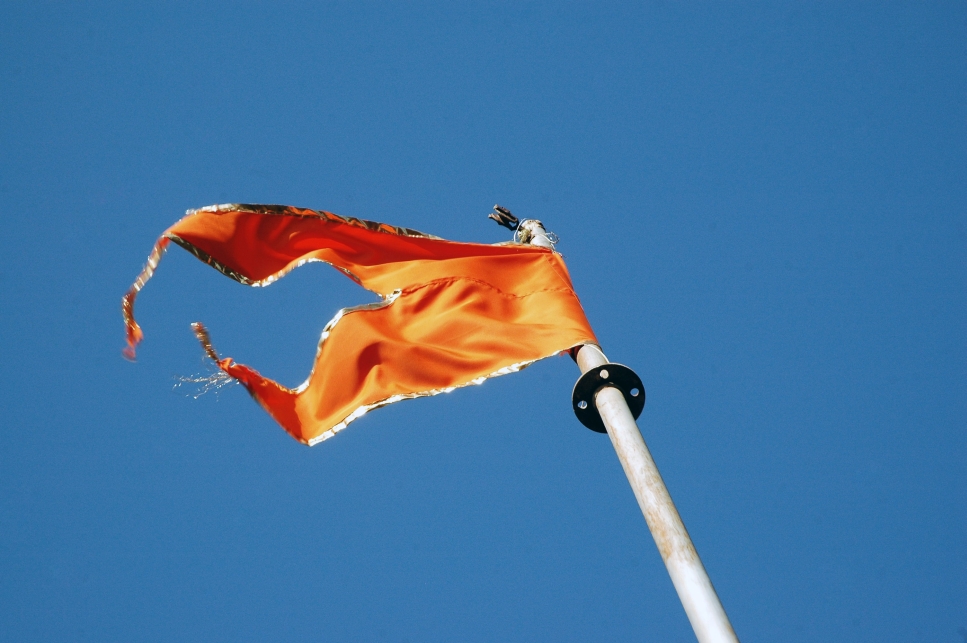By Aastha Tiwari

As I walk past the holy shrines of Ram Mandir, I am appalled by the mere thought of Gods being political. Hobbes said that human beings are innately selfish and always at a war with one another; these words can be felt in the political arena where politicians are ready to go to any extent to emerge triumphantly. Politics is not wicked or despicable. ‘Political’ is a ubiquitous and seemingly indispensable term in the discussion of human affairs, undeniably important to distribute resources, to establish stability in the society, to maintain territorial borders, to comprehend the modesty of affairs. As days turn to be bygones, everything that was once pristine and virgin, in terms of politics, has become politicized. The fact that politics has seeped insidiously into every aspect of not just our lives but also objects and things is shuddery. Much of our modern-day political polarization is the result of the politicization of everything, literally everything. The article reveals the subtle politicization of the basic and unnoticed things like colour, name, clothes, food etc, especially in light of the recent political climate of our country amidst the CAA/NRC protests and the saffronisation wave that has plagued the nation.
The politicization of Colour and Name:

What does orange or green colour invoke? For an individual of the 2000s, it just means colour or if I delve deeper, the significance of these colours, in particular, is they are represented in our flag. But in 2020, as I walk, dressed in an orange printed kurta embellished with the name of Ram (to worsen the situation), I am seen as a sanghi or part of right-wing. This change in perception is an outcome of the saffronisation wave that has infested the minds of people into associating a colour with their political ideology. In the very same way, the present times account for the politicization of clothes and name. When Shakespeare quotes “What’s in a name?” A Muslim in India silently whispered –“MY LIFE”. During the anti-CAA protests, men dressed in bhagwa, chanting Jai Shri Ram, tortured and butchered those wearing burkha or turban. Clothes, thus, became a political connotation. As I was traversing through the pages of the newspaper, my eyes couldn’t escape the brutality meted out to a Muslim man because of his name. These cases definitely account for minority cases but the underlying issue confronting us is the epidemic of politicisation that has plagued anything and everything.
Politicisation of food:
The situation exacerbates when there is an open glorification of politicisation of food and thoughts. One must wonder, how the world would look like if politicians and individuals started perceiving food from political lenses. What we eat and what we don’t is no more a matter of choice rather is a connotation of political affiliations. Beef-eaters are admittedly perceived to be Muslims, worthy enough of being lynched. The political thread running along the sacredness of Cow by the flag-bearers of Hindutva ideology is just one horrifying example of what our world would be if we allowed politicians to decide what we could possibly eat. Upholding, and not glorifying, the consecration of Cow, but the only question that leaves me cold is – which God gives you the license to kill others, primarily because of what they eat or think. We live in a post-enlightenment era, which is flooded with progressive ideologies and ideals, yet we cling on to preserving the long-gone traditions to an extremist end.
Politicisation of thought:

By virtue of Article 19(1) of the Indian constitution, all citizens shall have the right to freedom of speech and expression, only to be curtailed under ‘reasonable restrictions’. Are we really free to claim our thoughts in public, though? Theoretically, as per democratic ideals, we are free but if we take cognizance of the present political climate, a mere act of solidarity expressed is construed to be anti-national, making the person eligible for backlash. The narrative being fed to the people is coloured in orange, where there is no room for different vibrant colours, by the politicians. This is how politicisation of mind gets translated into polarisation where any views/act against the interest of the ruling party is crushed, labelled and measured. I often wonder if our nationalism is this petty, that it is threatened by the existence of a bare oppositional viewpoint. Today, we are wreathing ourselves into the intolerance that has grown manifold times owing to the politicisation.
Politicisation of media:
The whole scenario of news and its dissemination has undergone a transformation. The portrayal of any news is driven by a political motive. All the important news are politicized to benefit one political party and the viewers are bereft of authentic news. Viewers are fed what the media wants to show them which is in close association with the narratives of the political parties. We get different versions of the same story depending on what newspaper/news channel we subscribe to. One will go all the way to praise the ruling party while the other will fire cylinders on the ruling party. With this kind of tussle being the reality of Indian media, the real news gets lost. Media is the only way to know what is going on and the ultimate tool that shapes public opinion, but with this kind of authenticity, media has lost its charisma due to the politicization. Today, as we sit back on our couch and turn to the news channel, the only expression we witness is shouting and howling, where the media wears the garb of judiciary dispensing justice. The contemporary media fulfils the role of all the institutions except the role of being the fourth estate, what an irony. We can plainly see favouritism, biases in the way news are propagated and debate/discussion is held. The anchor becomes a politician projecting his personal views that aligns with the respective political party. This is the image of a politicized media. The politicization of media worsens all other tools of politicization as it is through media, we take cognisance of the present scenario of political climate. Thus, the media has the power to project the politicization for political gains, instead of what they really are. Media shouldn’t abuse its power as it has a large societal impact. Let us all pledge for a free, transparent and just media.
The current state of politicisation leaves me shivering with my heart desiring the caress of warmth of the India that was once envisioned. Inclusion of the word ‘secular’ was not just for the beautification of the preamble but was an epitome of the cultural and political fabric of India. Unfortunately, we live in times where an act of solidarity for a humanitarian cause, rape, sex, food, the very act of thinking and voicing opinion, clothing, colour, education and almost everything is weighed from the purview of political lenses. The mere thought that all our actions are open to political scrutiny is nerve-wracking. When radical feminists coined the phrase “personal is political”; they stood for bringing up the oppression that was neglected for being a part of the private sphere which is in no way an indication of undermining the idea of PRIVACY. We cannot escape politics today especially when everything is political. Mudslinging about politicization often reflects deeper assumptions and arguments on what is objective, what is neutral, what is true i.e. free from the distortions of political interference. In a world, where everything exists in a twilight zone, politicization is inevitable. But when this act of politicization translates into polarisation where the question of existential threat becomes the fundamental thing for one community, it is in this moment that we dismantle this politicization of politics done at the hands of politicians. If singing the national anthem and adhering to Hindutva ideology is a sign of patriotism and the onus to prove the loyalty hangs on the heads of MUSLIMS, then it is surely the right time to learn, un-learn, revisit and rethink the Indian politics.
Content writer Aastha tiwari is a girl who is stating at the clouds from the window sill listening to Surjan Stevens while contemplating the metaphorical undertones coloring the cloud. Role: Content Writer.Educational Qualification: Second year Political science major.Ultimate Goal: UPSC.Biggest achievement: Being featured as the writer of the month for Feminism In India.


